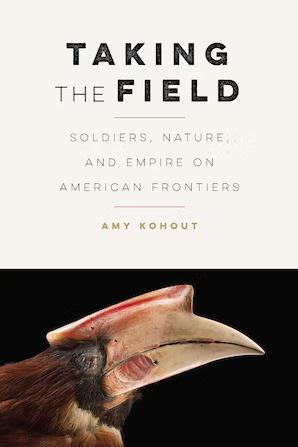




Working at the Ashinaga Foundation, I’ve learned many lessons from my successes and failures. I’ve learned to become comfortable and laugh at embarrassing moments, like when I attempt to speak Japanese in a meeting, but what leaves my mouth is a sound neither of us can recognize.

Currently, I am spearheading a project that will help African and Japanese scholars in our dormitory learn to live more comfortably together despite a strong language barrier and cultural differences.
I also joined my city’s volleyball team and have competed in tournaments regularly (and even won a couple)! One of the most significant accomplishments I am still grasping is becoming my best friend during the many moments of solitude, especially as I travel through Japan. As actress Ellen Burstyn once said, “What a lovely surprise to finally discover how unlonely being alone can be.”
I have been dabbling in a few new activities and clubs. Most recently, I have taken a crocheting class, mainly in Vietnamese, but my instructor speaks English, which has been very helpful. We meet mainly on Sunday morning and spend about three hours learning new stitches and patterns. It’s a great way to unwind and meet new friends!

I know math is not everyone’s favorite subject and can be especially challenging to learn in one’s non-native language. I braced myself for tiredness, boredom, and lack of interest in my class. But I’ve been amazed and delighted by the kindness and eagerness of my students. Inside the classroom, they diligently take notes and ask questions after class (most, at least). Outside of class, they chatter with me about their favorite American artists and film numerous TikToks. My students have opened up their worlds to me in unexpected and wonderful ways and I look forward to listening and learning more.



Recently, my students took their narrative writing quiz and had an interview assignment. I’m grateful for both of these assessments as, despite the resulting mountain of grading, they’ve allowed the students to share stories with me and given me greater insights into both my students’ backgrounds and Thai culture overall. I’ve also gotten to know many of the other lecturers quite well – we grab meals and play badminton regularly. However, looking beyond teaching, I’m still looking for ways to be involved and explore. I am looking forward to traveling to other parts of Thailand but also want to be more directly involved in other ways and am looking into several student and community organizations!
My favorite part of my experience has been watching myself become comfortable with the unfamiliar. I remember the first time I walked into a Kazakh grocery store, I was completely overwhelmed. Even the items I recognized, I was wary about (like mistaking cow’s milk for fermented camel’s milk or accidentally buying horse meat). I also recall not being able to print out stickers for fresh produce since the options were all in Russian and I was too embarrassed to ask for help — so the first week I definitely lacked essential nutrients and ended up surviving off of ramen. Eventually, I learned to embrace the unfamiliar. Now, when I roam the dairy section searching for milk, I casually note in my mind which item I think might be fermented camel’s milk and which is probably normal cow’s milk, and I don’t think anything more of it. If I need help printing out a sticker for fresh produce, I just ask someone nearby in my broken Russian/English mix, and although the communication is never perfect, it always turns out fine!

Having enough routine is important for feeling grounded and at ease, so I’ve continued a few regular rituals alongside picking up a few new ones. To take advantage of the cooler morning hours, I usually wake up earlier than strictly necessary and do a morning stretch/salutation on my east-facing balcony, then have a slow breakfast while my brain boots up. On a weekly basis, I bike with a group of much more experienced cyclists, have at least one buffet lunch at either an Indian or Buddhist vegetarian restaurant, and visit a cat cafe. I will probably start going to a morning market every Wednesday for produce as well.
Ever since my first weekend in Ulaanbaatar when my landlady took me out for lunch, drove me to the nearest supermarket, invited me to her summer home, and took me sightseeing around the city, I have seen how hospitable the people here are. Summer is fleeting so people take full advantage of it, which has been great for me because it’s been easy to join in on plans exploring the city and traveling to the beautiful countryside! Looking forward to a year of fulfilling work, delicious food (never expected to develop an obsession with Mongolian curd…), layers upon layers of clothing, and lots of growth.

I write to you from the home stretch of “the Asia trip” – shorthand for what used to be an annual trip to visit Fellows in their posts, to meet with host organizations, and to connect with alumni, friends,

Over the past three weeks, Program Director Matt Hernández and I visited seven of our Fellows, met with host organizations, alumni, and friends, and cultivated new partnerships in Ulaanbaatar, Mongolia; Almaty, Kazakhstan; and Bishkek, Kyrgyzstan. It was Matt’s first trip as a Program Director and my first time making such a
our colleagues at the American University of Central Asia in Bishkek. In each of these interactions on our journey, I felt the warmth, appreciation, and ease of reconnecting with old friends.
Matt and I also had the privilege of meeting new friends of PiA. We conducted PiA’s first official visit to Astana, the capital of Kazakhstan. We were honored to speak at Nobel Fest V, where we shared the physical and virtual stage with Nobel Laureates and luminaries in science, tech, and education. It was a humbling experience to be in such company and to be in dialogue with the Kazakhstani students and educators who joined the conference in person, as well as the virtual audience from Central Asia and beyond. As we shared PiA’s vision and framework for cultural exchange, it was exhilarating to see how deeply our mission, vision and values
to reconnect with old friends – from our closest contacts at KIMEP University, with whom PiA has enjoyed 28 years of partnership, to our Country Advisors in Mongolia, who recalled with great fondness the very first PiA Fellows who served in Mongolia some 15 years ago and the many who have followed in their footsteps, and
•
•

resonated with the audience. In a spirited Q&A, over tea and cookies after our talk, and in follow-up meetings, our new friends and colleagues showed us how eager they were to embrace the platform for learning, sharing, and collaborating across difference that PiA so effectively provides.
Finally, I had the honor of joining the inaugural PiA Talk Forum in Taipei, an event organized by PiA Country Advisor Pei-Ting Sarah Chou and co-hosted with A4P, the Asian American Alumni Association of Princeton. Organized around the theme of “International Talents in Taiwan,” our panel and audience discussed how diverse talent can come together in Taiwan to create positive impact. Later, over pork belly, I reconnected with four PiA alumni who have made their homes in Taiwan and who are all carrying forward PiA’s mission as teachers at Taipei American School.
Marcel Proust wrote, “The real voyage of discovery consists not in seeking new landscapes but in having new eyes.” This year, I traveled to landscapes – some familiar, some unfamiliar – but I saw everything with new eyes. The colors were brighter, the connections were warmer, and time seemed to slow down. All this to say: this month was a crash course in the enduring power of PiA.
Just as this year’s Asia trip has helped me to see our work with fresh perspective, I hope that the stories in this edition of Pacific Bridges spark interest and curiosity about PiA’s work, call you to reconnect with an old friend from your fellowship, your host community, or the PiA family, and help you to see with fresh eyes the power and importance of building bridges across difference.
Yours sincerely,
We mourn the loss of Dr. Richard Eu Keng Mun, who passed away at home in Singapore on September 7, 2022 at the age of 99. Richard animated the values of Princeton in Asia – from the difficult undergraduate WWII years rooming with the only other Asian student on Princeton’s campus, Japanese student Ken Ikeda – into his last decade. He quietly reached out to people who were different, welcoming them into his family, and helping them thrive; he built bridges with people, businesses, and institutions.
Born into a large, dynastic Chinese family, Richard was uniquely soft-spoken, kind and very effective behind the scenes. He selflessly shunned the limelight, charitably leaving it to others, while quietly leading and building Eu Yan Sang, Lee Wah Bank, UOB Bank, Singapore Institute of Management, Community Chest, Princeton Alumni Club – and especially, deep personal relationships far beyond Asia.
Richard’s impact on PiA was broad and deep. As a champion for PiA in Singapore, he spearheaded strong partnerships with Ngee Ann Polytechnic in 1993, Temasek Polytechnic in 1995, and the Ministry of Education in 2008, all paving the way for 215 PiA Fellows to serve those host institutions, plus others elsewhere. He trailblazed PiA’s first Field Office at Ngee Ann Polytechnic in 1993, home to PiA in Asia for well over a decade. These deep, long relationships were pivotal to PiA’s efforts to develop a thriving program across Southeast Asia.

His grandfather, Eu Kong, named his company Eu Yan Sang in 1879, Yan Sang meaning “caring for mankind” (from the Cantonese). His goal was to help suffering tin miners addicted to opium. Richard continued to champion this vision his whole life by serving others. Positive ripples radiated everywhere, sometimes as fairy tales: his youngest son Geoffrey and his Princeton roommate’s daughter Emi married just a few months after meeting, during her first visit to Singapore!
Our PiA family sends its deepest condolences to the worldwide Eu family, including his daughter Helena Eu, longtime Director of PiA Singapore Ltd.
– Jon Wonnell, Taiwan ’81-‘83 and PiA Emeritus Trustee


Elliot Galvis is a current PiA Fellow from the Class of 2021 completing his fellowship at the Siam Society in Bangkok, Thailand.


The Siam Society is a member-based cultural organization dedicated to promoting understanding of Thai culture for a local and international audience. Its motto, “Knowledge Gives Rise to Friendship,” drives the core of its activities, including cultural performances, lectures, an academic journal, and study trips. A decade ago, the Siam Society also founded the Siamese Heritage Trust to support local communities and advocate for protecting cultural heritage sites at different levels of government in Thailand. In a city that continues to expand as rapidly as Bangkok, this work is crucial in safeguarding old neighborhoods in collaboration with the people living there.
Located in the center of Bangkok, the Siam Society operates an award-winning library and the Kamthieng House, a traditional building transported from Chiang Mai province which now serves as a museum on Lanna culture. The staff of the Siam Society are all Thai (except for myself), and while my supervisor and some colleagues speak English very well, working there has been a great opportunity to practice my Thai with native speakers.
Since 2019, the Siam Society has worked with seven other cultural heritage organizations from Southeast Asian nations to establish the Southeast Asian Cultural Heritage Alliance (or SEACHA). Since I arrived in November 2021, most of my work has been dedicated
with leaders from across Southeast Asia during my fellowship, and I have recently been able to meet some of them in person as COVID-19 restrictions lift in Thailand.
As part of the SEACHA secretariat, my work revolves around organizing a two-part program entitled “Cultural Wisdom for Climate Action: The Southeast Asian Contribution.” This program focuses on how practices and knowledge systems in Southeast Asia can be effective – or are counterproductive – for tackling the region’s climate crisis, including in agricultural practices, design strategies, sociopolitical traditions, and native systems of land management. We have divided this program into two parts: a capacity building workshop for young Southeast Asian leaders that took place this past August, and a conference that will feature our youth participants alongside senior cultural experts in January 2023. SEACHA’s goals with these programs are to center Southeast Asian perspectives, to foster interregional and intergenerational dialogue on the importance of cultural heritage for shaping sustainable policy, and to foster a network of young leaders who will fight to preserve local knowledge and pursue climate action going forward.
to SEACHA’s programs pursuing its mission to promote regional government-community partnership in cultural heritage management, strengthen the ASEAN Socio-Cultural Community, and serve as a networking forum. SEACHA has spent the last three years coordinating activities including the “CHA-Time” monthly lecture series and a training clinic in Siak, Indonesia that coached local officials on cultural heritage management within their community. Working at SEACHA has given me the opportunity to collaborate
I have worked closely with my supervisor at the Siam Society to organize the workshop and conference programs at each stage, including recruitment, fundraising, and coordinating logistics for each event. Given the scope of SEACHA’s activities and its relative novelty as an organization, it can be very challenging working as part of a small team with stakeholders from eight ASEAN countries. But with that challenge has come a very rewarding experience learning more about not only Thailand, but about communities from across Southeast Asia. As I finish my post here in Bangkok, I am struck by how far the experience has taken me even with the restrictions imposed by COVID-19 over the last year. I can only imagine how it will continue to shape me from here.
In 1999, Greig Craft founded AIP Foundation to implement transportation safety initiatives in low and middle-income Asian communities. AIP initially focused on developing and promoting lightweight, low-cost motorcycle helmets in Vietnam. Over the years, it expanded its scope (to issues like pedestrian safety, safe school zones, driver’s education, etc.) and geographic reach (to Cambodia, China, Thailand, Myanmar, India, the Philippines, Tanzania, and Uganda).
Since 2008, AIP Foundation has welcomed 31 PiA Fellows to its Phnom Penh, Bangkok, Hanoi, and Ho Chi Minh City offices. As described by CEO Mirjam Sidik, PiA has impacted AIP Foundation in three major areas: infrastructure, partnerships, and innovations.


She notes that PiA has “helped us to develop a stronger internal operating system,” especially in Development and Communications. These departments benefit from solid processes and continuity as a result of responsibilities being transferred “from one Fellow to the next [through] comprehensive handovers.” That system was tested by COVID. As the last Fellow sent to AIP Foundation between summer 2019 and spring 2022, Molly Stoneman (Vietnam ‘19) witnessed the negative effects of a disrupted influx of Fellows. Ultimately hired by AIP Foundation, she has progressed through several roles, most recently Strategic Impact & Partnerships Advisor. Stoneman emphasizes that PiA has been “fundamental to AIP Foundation’s maturity as a nonprofit over the years to expand within Vietnam, within Southeast Asia” to create an international community of road safety advocates.
PiA has also benefited AIP Foundation by securing long-term, sustainable partnerships such as the USAID-funded project Garment and Footwear Sector Road Safety Strategy. This initiative advo-
cates for transportation safety for Cambodian garment factory workers. Sidik notes that the project’s “whole approach, concept, and proposal were developed with the help of PiA Fellows.” Jimmy Tang (Vietnam ’18) and two other PiA Fellows collaborated and “bounced ideas off of one another … ultimately putting them into one project design,” an initiative that still exists today.
Recently, a former Fellow connected AIP Foundation with UC Berkeley's Transportation Studio. In this partnership, graduate students will research mobility/road safety issues in Asia before recommending policy initiatives for AIP to pitch to governments.
Tang echoes Sidik’s third assertion that Fellows infuse AIP with “innovative ideas.” Currently AIP Foundation’s Development and Strategic Partnerships Manager, Tang oversees Fellows. He appreciates the tremendous value of “new ideas and perspectives coming in [each] year … Now we have a solid team of permanent staff and PiA Fellows to support development functions.”
An example of what Sidik describes as “out-of-the-box thinking” is Stoneman’s pitch for an AI-algorithm-driven approach to road safety. Using global satellite data, AI technology can predict traffic flow and areas most susceptible to crashes. By connecting AIP Foundation with the International Road Assessment Programme (iRAP) and obtaining a grant, Stoneman positioned AIP Foundation to pilot Southeast Asia’s first AI predictive traffic flow project.
AIP Foundation’s impact on PiA has been equally positive. Stoneman enthusiastically describes AIP Foundation as a family that cares for Fellows; helps them adjust to and explore the community; and provides valuable learning opportunities, high levels of responsibility, and incredible experiences.

For some PiA Fellows, one year in Asia is not enough. The Carrie Gordon Tribute Grant, also known as the Carriebright Fellowship, seeks to nurture the wild ideas of PiA Fellows and transform them into meaningful action. Established in memory of a beloved former PiA Executive Director, the grant offers up to $10,000 for a PiA Fellow or recent alum to pursue a work or service project in Asia. Grants are awarded based on a project’s feasibility, sustainability, and impact. Since its creation in 2005, the Carriebright has funded 17 projects in nine different countries in Asia. As PiA prepares to relaunch the Carriebright Fellowship, we wanted to check in on a few past grant recipients and see what’s happened in the years since.
Wes Hedden (Vietnam ‘06) moved to Cambodia shortly after finishing his PiA posting in Can Tho, Vietnam. Through his work in both countries, he’d encountered what seemed to him to be a shared history of animosity and suspicion between Cambodians and Vietnamese, one that manifested in mirrored forms of oppression and systemic exclusion in both countries. He imagined a comprehensive exchange program for potential young change-makers, incorporating in-country site visits, volunteering, and language practice. He drafted a proposal for the Carriebright and won the grant in 2011 for the Sarus Exchange Program, named for a crane that migrates between both Vietnam and Cambodia annually.
In its first year, 24 university students – a dozen each from both Cambodia and Vietnam – pursued separate community projects in their home countries before meeting together in both Siem

Reap and Ho Chi Minh City for service-learning opportunities. The program grew organically as Sarus collaborated with other local organizations to respond to the needs of its participants. After four years of the initial exchange curriculum, Sarus partnered with Volunteers in Asia to facilitate sports-based exchange programs between Cambodia, Vietnam and the US. Sarus later became more explicitly focused on peacebuilding and conflict transformation and in 2016, it began an all-women-identifying exchange program between Bangladesh and Myanmar, placing participants in longer-term internships with regional peacebuilding organizations. Most recently, Sarus led a Peace Leadership Incubator program in Yogyakarta, Indonesia which invited all former Sarus alums to apply for a 10-day peacebuilding and conflict transformation training; six participants completed the program, receiving grant funding for local community projects.
Some parts of Sarus remained relatively unchanged throughout the years. To this day, Hedden believes the foundational element of the peace circle was the most transformative part of the program: facilitated discussion groups where participants could explore what they were learning and feeling, using a restorative justice model. Raymond Hyma of Women Peacemakers Cambodia, a Sarus alum, noted the unique perspective
HeddenWes
former Sarus participants bring to WPC’s facilitated listening work. Sarus provided its participants with their first “meaningful encounter with the other” helping to shift their consciousness to be able to lean into discomfort.
Hedden is certain the Sarus program would not have been possible without the unique funding structure of the Carriebright. Other grants can come with restrictions that limit creative potential and cross-border exchange. As noted by Dan White (Vietnam ‘05), another Carriebright recipient in Can Tho, “the fact that the Carriebright exists gets Fellows thinking… ‘how might I contribute, get involved, or learn in a different way than what’s already preestablished?’”.
For Clare Gallagher (Thailand ‘14) and Haley Read (Thailand ‘14), deep attention to their host community inspired their Carriebright fellowship. Posted in Bangsak and Phang Nha, respectively, the two recall spending almost every weekend in the water. Gallagher taught English at R35, a boarding school within sight of the ocean, and quickly realized that none of her students ever came to swim. Why, Gallagher and Read wondered, were the beaches of one of the world’s top tourist dive locations seemingly inaccessible to the local children? Eager to understand, they discovered that most of the students couldn’t swim. Additionally, the ocean was a place of broken trust – Bangsak, located near Khao Lak in Southern Thailand, was devastated by the 2004 Indian Ocean tsunami. Despite their proximity, the students seemed to live a world away from the sea.
Gallagher and Read began asking their Thai co-teachers about the possibility of taking the kids for a beach day. What began as a field trip suggestion quickly evolved, with the help of the Carriebright,


into “Earthraging with English,” an ambitious program combining water safety, ecological responsibility, and marine science. Gallagher and Read developed a curriculum that included ocean swim lessons, beach clean-ups, and a snorkeling trip, all carried out in partnership with local dive shops.
In the years since its creation, Earthraging - which takes its name from a cavalier phrase for outdoor adventuring, borrowed from Read’s friends back home in California - has become a staple extracurricular activity run by the English Department at R35. R35 students now learn to swim in a local pool with the help of local dive shop partners. Snorkel trips are a reward for engaged participation in swim class. Sam Snyder (Thailand ‘19) says at least 300 kids got to go snorkeling during his time at R35, the culmination of many days spent in the pool. Many students repeat the program each year for fun and Earthraging is still sustained by local dive shop partners who donate equipment and staff and additional support from fundraising efforts in the US. Gallagher and Read stay in touch with each new class of Fellows who arrive in Bangsak, to give an overview of the program and offer their guidance. If Earthraging occurs “even one day of this a year, that’s a success,” says Gallagher. As she sees it, the message of Earthraging is simple: “the water is for you.”
The COVID-19 pandemic necessarily put most regional programs on hold, offering a chance for reflection and change. The Sarus Exchange Program has elected to go dormant for the time being. Earthraging with English continues, though considerable turnover in the local dive shops – often staffed partially by foreigners who were unable to travel to Thailand during the pandemic – means the Fellows in Bangsak will likely need to build new relationships from scratch. But the pause has also given necessary time to consider the successes. Sarus has produced well over 200 alumni, who now work in a variety of fields. Clare and Haley estimate that well over 1500 children in Bangsak have had at least one day in the water.
The lives of the grant-recipients have also been forever changed. Wes Hedden’s work with Sarus ultimately led him to pursue a PhD in Peace Studies and Sociology at Notre Dame, where he is currently in his second year, and Clare Gallager and Haley Read have remained close, and point to the Carriebright fellowship as the foundation of their friendship. All three have never fully turned their gaze from Southeast Asia and the potential work to be done. And so the Carriebright carries on, creating small but meaningful change in the places and people it touches.
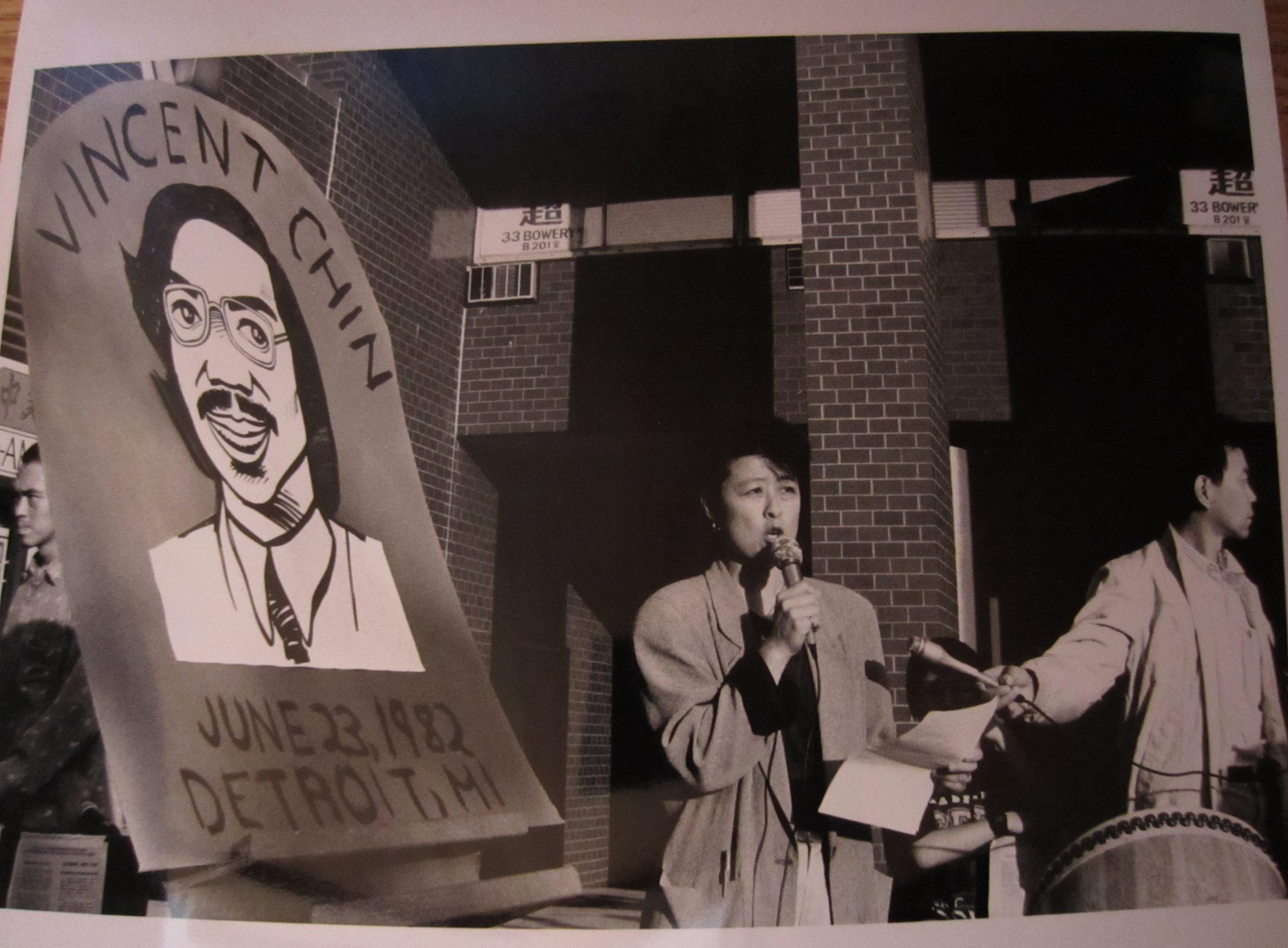 by Olivia Wolf | China ‘18
by Olivia Wolf | China ‘18
These three PiA alumni are wielding their professional skills to fight back against anti-Asian discrimination
It was 1972 during the peak of the Cultural Revolution when Helen Zia, a senior in Princeton’s first co-ed class, landed in Hong Kong with a grant from Princeton in Asia to complete her thesis on the restructuring of China’s healthcare system. Change permeated the air, not only in the PRC, but also in the United States, where Zia had spent her high school and college years protesting the Vietnam War, fighting for Roe, and collaborating with her peers to establish a center for students of color at Princeton University.
“How do you really use a political philosophy of change—of revolution?” Zia had asked herself. “Back in the sixties and seventies, this is what students talked about,” she says. “We were all about trying to make significant changes in society. It’s kind of like today where people are talking about how to address systemic issues like racism and sexism.”
Zia, along with Bina Venkataraman (Vietnam ‘05) and Edgar Chen (Kazakhstan ‘97), have managed to incorporate PiA’s values of building cross-cultural bridges throughout their careers, whether that’s been through direct AAPI activism like Zia, establishing a news platform for conversations about race like Venkataraman, or applying legal knowledge to combat pandemic-induced hate crimes like Chen.
Although Chen had studied East Asian history at Princeton and worked as a PiA Fellow, it wasn’t until the pandemic that Chen began to see his own Asian American background as a core part of his identity.
“I think the pandemic and the hate crime wave brought into sharp relief that I do have an identity that is not just my schools and my government service,” says Chen. “I have a cultural and ethnic identity as well, and I think it was just a calling—to work in an area combating hate crimes.”
The surge in anti-Asian discrimination began in February 2020 when Asian Americans were scapegoated for causing the COVID-19 pandemic that originated in China. In response, organizations like Stop AAPI Hate were swiftly established to track incidents of discrimination, which were only exacerbated by President Trump’s endorsement of the term “China virus.” Then, in March 2021, a white gunman in Atlanta murdered eight people, including six female massage workers of Asian descent.

“I think it was a galvanizing moment, especially for the legal community because, you know, what is happening is discrimination,” says Chen. “That is an issue that has a unique legal role for lawyers.”
In 2020 Chen joined the National Asian Pacific American Bar Association (NAPABA), first as the policy director and then as a special advisor. One of his responsibilities was to match victims of hate incidents with pro bono representation from the Alliance for Asian American Justice, a consortium of the nation’s top 90 law firms created to combat anti-Asian crimes.
Though events like the Atlanta shooting provide grounds for prosecution, most reports fall under the category of non-criminal incidents, according to Stop AAPI Hate. For example, victims of racist verbal assault are generally unable to pursue legal action
due to the First Amendment. To address issues outside of legal jurisdiction, NAPABA has allied with mental health providers to provide additional support.
This year, NAPABA, whose mission is to promote the interests of both its members in the legal profession as well as the AAPI community at large, backed two pieces of legislation in light of the recent hate crimes: one aimed to destigmatize mental health issues within the AAPI community, and the other aimed to increase Asian American studies in K-12 classrooms. Chen expects that education will help to break down the stereotypes that Asian Americans are both perpetual foreigners and monolithic. He also hopes that the curriculum will help people to see events like the internment of Japanese Americans not only as Asian American history but also as an integral part of the American story at large.
Venkataraman, a science policy expert and the Editor-at-Large at The Boston Globe, also saw a way to leverage her professional background to address social injustices after meeting with Ibram X. Kendi, author of How to Be an Antiracist, in the summer of 2020. After discussing the effects that Boston’s 19th century abolitionist newspapers had on helping the public to imagine a future without slavery, the two decided to launch The Emancipator as part of The Boston Globe to encourage conversations about how to create a more equitable society today.
Venkataraman witnessed the detrimental effects of discrimination during her PiA year in Vietnam where she worked as a public health grant writer and strategist for an HIV/AIDS initiative
national policy for four years. These basic healthcare providers attended to the poor in rural communities and proved to be a highly effective, low-cost solution to reducing disease.
The idea of creating systemic change to serve the people stuck with Zia when she returned to the U.S. After attending medical school for two years, Zia decided to dedicate the rest of her life to social advocacy and journalism.

In the early 1980s, Japanese car companies were booming, and the American auto industry was in decline. Anti-Asian sentiment was rampant, culminating in the racially motivated murder of an innocent Chinese American, Vincent Chin, who was celebrating his bachelor party at a club in Detroit. The two white men who murdered Chin, an employee of Chrysler and his stepson who had recently been laid off from an auto factory, were sentenced to only three years’ probation and a $3,000 fine.
“There was no justice for Vincent Chin,” remarks Chen. “The legal system somehow let the AAPI community down.”
At the time, Zia was working in Detroit as a community activist and journalist, which put her in a position to rise as a leader in the movement to bring justice to Chin. Through her writing, Zia rallied Asian American activists and launched the modern fight for AAPI empowerment.
centered around a leprosy hospital. Even when medication was available, many remained undiagnosed and untreated because the stigma would lead to ostracization, not only for them, but also for their entire families.
“After my time in Vietnam I couldn’t really see problems of the world as neatly fitting into distinctive categories such as public health, inequality, or culture,” says Venkataraman. “The problems we face are interrelated.”
Though Venkataraman identifies more as a journalist than an advocate, she is a staunch supporter of human rights. To create a more equitable society, Venkataraman emphasizes the imagination as a key tool.

“When it comes to social movements and advocacy, including AAPI advocacy, imagination of a different reality than the one many people are experiencing today can be powerful,” says Venkataraman. Making choices today to contribute to that desired future gives people a sense of agency and is a form of what Venkataraman has coined “pragmatic optimism.”
Step by step, new and better policies have the power to improve the lives of thousands, as Zia witnessed with China’s healthcare system.
Back in early 20th century China, infants were dying from diphtheria and dead bodies lined the streets, waiting to be carried away by trucks. By the time Zia reached the mainland in 1972, the barefoot doctors program had been integrated into Mao Zedong’s
“Back then it was not so common for different Asian ethnicities to join together,” says Zia. “There had never been a national Asian American voice to talk about racism.”
Though the perpetrators never saw a day in prison, the movement led to significant advances in social advocacy. Zia co-founded the American Citizens for Justice (ACJ), an organization dedicated to Chin’s legacy and intersectional AAPI activism, and Michigan enacted the “Vincent Chin Rule,” which allowed victims to make impact statements during sentencing. National attention was focused on anti-Asian discrimination as protests erupted throughout the country, and ACJ was joined in solidarity by activists in Jewish, Black, and other communities.
One of the biggest differences in activism that Zia has observed between her time as a student at Princeton and today is the current lack of solidarity between various social groups.
“When there were so few of us at Princeton, we really saw that, not only was it a good thing to be working together, we needed to work together,” says Zia. “That has changed over the 50 years. Now with greater numbers, people may have the mistaken impression that they don’t need to work together with other communities.”
Chen also emphasizes the importance of focusing on shared history and goals to combat hate discrimination. He points to two recent events in Georgia, the 2020 murder of Ahmaud Arbery, a Black man, and the 2021 spa shootings, as galvanizing moments for Black and Asian activists.

“Georgia, which had been the cradle of the civil rights movement, became the epicenter of racial injustice and an example of suffering for two communities of color in this country,” says Chen. “There’s that shared humanity and the need for solidarity.”
Chen encourages the AAPI community to engage in civic life, which Asian Americans have historically abstained from. In the past year, however, AAPI voters were the fastest growing demographic segment with a 47% increase in turnout.
Today, the U.S. is experiencing another wave of anti-Asian sentiment reminiscent of the ‘80s, though due to COVID-19 and economic tensions, China has replaced Japan as the perceived threat. In the past two years, more than 11,000 hate incidents have been self-reported to Stop AAPI Hate, and one in five Asian Americans experienced a hate incident in 2020 or 2021. Two to one of these victims have been female.
“What we’re seeing today, unfortunately, is very similar to when I was leading a national movement against that anti-Asian violence,” says Zia. “History doesn’t move in a straight line. There are zigzags. There are ebbs and flows, and right now is a time of a lot of flow, just like it was in the 1960s and ‘70s.”
Most recently, Zia has been working on the Vincent Chin Legacy Guide, a 64-page historical and educational tool covering the effects of Chin’s murder on civil rights up until present day. The guide is currently available online and in print and is set to be translated into a variety of Asian languages to better reach immigrant populations.
One of Zia’s hopes for this guide is that it will help to dispel false narratives, such as the one that most perpetrators of anti-Asian hate crimes have been Black (while these incidents have occurred, studies show that most perpetrators have been white men). The guide also talks about how the model minority stereotype, a term created in 1966 by a white sociologist, has served as a counterpoint to other people of color in order to divide groups and prevent them from enacting change.
“That is political power, and that is power that matters,” says Chen. “That is something that folks need to understand is important for the betterment of their lives.”
Zia uses a bell curve to demonstrate people’s attitudes towards social change during the civil rights movement. On one end were the people striving to make positive change and on the other were the people actively resisting it.
“The vast majority of people in the middle, they would rather just play their video games or lead a peaceful life,” says Zia. “What makes change is people realizing that unless they do something, their life is not going to be peaceful—they have to do something.”
That was the end that Zia fell towards.
“I felt like if there’s something we can do personally to make a difference, we should,” says Zia. “If you have it in your power to help one person have a better life, why wouldn’t you?”
PiA Fellows bridge national boundaries with the goal of promoting cross-cultural understanding and are in a unique position to foster that understanding within the U.S. too.
“It expands their [Fellows’] minds and their outlook on the basic humanity that we all have,” says Zia.
On a final note, Zia encourages us all to care enough to act, whether that be in the form of dedicating one’s life to activism, showing up to a demonstration, or just writing an email. “Why wouldn’t we try to leave the earth and human society a little better off than when we came into it?”
The deep and unique history of the Princeton in Asia program and network in China spans three centuries there, beginning in 1898, when Robert Gailey crossed the ocean to Tianjin to establish the first YMCA in the Beijing region.
During much of the twentieth century China was closed to Fellows, particularly after World War II, when much of the focus on Chinese culture and language shifted to Taiwan, including Tunghai University in Taichung, where I was fortunate to teach and study in 2003-2004.
After Richard Nixon and Henry Kissinger visited Mao Zedong China in 1972, diplomatic detente ensued, and PiA Fellows increasingly returned there, filling an abundance of postings across the country.
Yet in Princeton in Asia’s 124 year history in China, there has been no period quite like the last three years. China today finds itself at an incomparable historical moment, at the modern nadir of its own economic development, political consolidation, and global cultural strength. At the same time, China has responded to the COVID-19 pandemic with a strict zero-COVID strategy, one that defines and shapes everyday life in the country.
As one alum put it, “No one who has lived in China prior to COVID can adequately comment on what it’s like right now.”
In this spirit, to better understand what life in China has been like in recent years, we caught up with four PiA alumni who have been living there.

Jamaica Pouncy served as an English lecturer at Northeastern University in Shenyang during her fellowship in 2015-2016.


The experience proved so impactful that she leaned further into international education and China. After PiA, Jamaica worked variously as an English teacher in Suzhou and as a study abroad program officer at Yale. Pivoting to diplomacy, she applied successfully to the U.S. State Department to make foreign service her professional focus, and she returned to Shenyang as a diplomat in September of 2019 for a multi-year tour, which she just completed this past summer.
What has changed in Shenyang between your initial placement as a Fellow and your second tour as a diplomat?
The first big shift is an increasing comfort with diversity. When I lived in Shenyang in 2015, people were just not used to seeing people who looked like me. In 2020, I wasn’t such an anomaly and there’s a broadening of people coming into each other’s lives and mixing and mingling. Second, in 2015, America was more positively represented. Now there’s more of a sense of “We’ve seen the news. Things are not so great over there.”
I’ve also seen an increased appreciation for creativity. Social media, TikTok and technology has really inspired people to produce products no one else is and push for intellectual property.
What has struck you about life in China during the pandemic?
Being part of Chinese society during COVID was absolutely eye-opening. We had an app that tracks where you’re going, who you’ve been in contact with, whether or not you’ve been exposed to COVID, and you need this app to be allowed into the bank, into many places. They can take that information and show up at your home and say “you are a close contact. You need to come with us.” In the U.S., we’re almost begging people to quarantine. The Chinese government just sends out a directive.
How is your own professional interest in China evolving?
I’m committed to learning more about China, and to hopefully facilitate the
conversation between the U.S. and China. That’s what our world needs – more people willing to come to the table and talk, to be vulnerable in different spheres and, to hear each other out, and meet in the middle.
Matt Blazejewski serendipitously took a chance on Mandarin in his freshman year, so the language, culture, and country of China captured his interests early. Just two weeks after his college graduation Matt set out for the East, and he hasn’t turned back since.

Matt served his fellowship as a consultant for a small ed-tech firm in Hangzhou beginning in June of 2017, and it’s in China’s tea and tech capital on the West Lake that he has remained. Matt now serves as the Admissions Officer for Wellington College International, Hangzhou, and he conducts a majority of his workday in his constantly improving Chinese.

What are your friendships like in China? Western news and Western media often treat mainland China as a monolith, focusing on the stories that are a bit more sensationalist, but most things at the political level don't affect me on a daily basis. For me, it’s my Chinese friends who are some of the most open and vivacious people, curious to learn about different cultures. There's so much here that can be explored. After five years, I feel like I've only scratched the surface.
What keeps you fascinated with your time in China?
COVID has been both good and bad, but it's certainly not an experience I regret. Once you spend more time here, you start to realize that we're all human and we’re sharing connections, experiences, and these historic moments at the same time together.
Folks here are really willing to share what they know and build human relationships, and through mutual understanding and shared experiences, surface level differences tend to fade away.
Peter (Pei) Hao taught English at the Wuhan University of Technology from 2017-18. The experience was deeply transformative for him as a Chinese-heritage Fellow on personal and professional levels, and it reinforced his professional focus on health care in the developing world, and specifically in China.

Pei has spent the last three years in Beijing as Managing Editor of China CDC Weekly, China’s primary English language national public-health bulletin and peer-reviewed journal. In this capacity Pei authored and published some of the first official reports on COVID-19.
What do you remember from your fellowship in Wuhan?

It was extremely exciting to see a place so untouched from foreign influence and so diversely Chinese. I played basketball and mahjong with students and built my friend network that way. I got insight into their backgrounds (some came from real estate developing families and others from rural farms in the province) and their perspectives of China’s place in the wider world, which I felt was humble but optimistic.
What has life been like in China lately?
While the initial pandemic period, January 2020 through April 2020, was extremely scary, the following period of time was very relaxed as everyone bought-in for the response measures, and we were given plenty of freedoms as a result. We wore
masks, complied with governmental digital contact tracing measures, and reduced travel; in return, we were allowed to have indoor dining, gatherings, and go drinking. However, with the advent of Omicron, it has become much more difficult.
What would you say to future Fellows who hope to study, work, and live in China?
I highly recommend gravitating towards taking positions or short-term work in Tier
2 and below cities, as they will be intensely illuminating for the reality of Chinese development. Beijing, Shanghai, Guangzhou, and Shenzhen are not representative of China as a whole, similar to how you cannot say that the US is just New York, the Bay, or LA.
This is perhaps one of the most unique and interesting periods of national development I know of. No one who has lived in China prior to COVID can adequately comment on what it’s like right now.
How can PiA Fellows continue to understand changing China?
I would encourage the PiA community to be more skeptical of all messaging regarding China. Please consider that given the specific circumstances, decision-makers are rational and the decisions made have their rationale.
Lisa Heller began her career in Asia 35 years ago in China’s northeast. Freshly minted out of Princeton University in 1986, she accepted a yearlong posting as an English teacher at the University of Science and Technology in Dalian. The fellowship proved transformative, as Heller joined the Foreign Service in 1991 and served her initial posting in Beijing. It would be the first of many diplomatic tours of Asia, including Seoul, Islamabad, and Shenyang. Heller currently serves as Consul General of the Consulate General of the United States of America in Guangzhou, China.


With the long vantage of your career in China, what strikes you about change here?
The China that I came to around 35 years ago was very different. Not only have there been a lot of changes, but the speed of those changes has been extraordinary. It doesn’t really matter what your field is, you can see changes happening in China on a scale and speed that you would never be able to see anywhere else in the world. It always surprises.
What gives you optimism about the U.S.-China relationship?
If you see what China has been able to create over the last 30-40 years, be it technologically or economically, you know that this is a country of extraordinary possibilities
with highly motivated and capable people. We have to make this relationship work for the good of the world. We’re not going to deal with the climate crisis, international narcotics issues, and many other issues without China. We have to find a way to kind of harness some of that potential to really make the bilateral and then ultimately the multilateral institutions work. It is critical for our whole planet.
What do you say to Fellows, teachers, students, and diplomats who want to contribute to the U.S.- China relationship?
The bilateral relationship with China is probably the most significant and challenging one anywhere in the world on any given day. If you want to be on the front lines of
diplomacy, this is the center.
I would also say that for people in the private sector, it’s on the front lines of a lot of business and technology these days. This is a very important place, and so for a lot of us, the rewards of a career in China outweigh the challenges.
We need good people working on the relationship. We can’t just say that the politics and travel right now are too hard. We need people committed to the long term relationship.
Hometown: Berne, New York
PiA fellowship position: ChildFund Laos, Nonghet, Laos (2017-2019) University: Elon University
Current city: Vientiane, Laos
Casey Morrison never expected to spend more than a year in Laos, let alone become a respected expert on gender equality, yet here she is, five years later, feeling more Latioan than anything, fluent in a language she couldn’t speak a word of, and now the 28-year-old has adopted Laotian family members (whom she considers the same as her birth family) scattered across the country’s provinces.


Laos itself was never a part of the plan for Casey, who during her bachelor’s studying Public Health at Elon University, spent her senior year abroad in Vietnam. It was Vietnam that then won her heart and that drove her to apply for a fellowship in the Mekong Delta with PiA, where she intended to return to the beloved host family she had stayed with during her independent research project. However, PiA had other plans, with Casey getting a curveball: “We’re not going to offer you the position in Vietnam. Do you want to go to rural Laos?”
The position would be with ChildFund Laos in the quiet mountainous border town of Nonghet. The remote location was difficult to find the right person for, but coming from a rural setting herself – a childhood with fond memories of hay fields and farming in upstate New York – Casey decided to accept the opportunity. There hadn’t been a Fellow there in years and if she didn’t do it, perhaps there wouldn’t be a future for the fellowship there.
Without a lick of Lao and no way to communicate with anyone when she arrived in Nonghet, Casey became fast friends with her coworker Mo, who she remembers wanting desperately to talk to, though Mo couldn’t speak English. “She was like a mother, but a
friend, but sometimes an older sister, sometimes a younger sister. We just have all the relationships in there,” Casey said of Mo, who later became her roommate/Lao cooking instructor/language tutor/farming partner/best friend/sister and everything in between.

Casey’s role at ChildFund evolved greatly over the course of her time in Nonghet, from teaching English to the staff to working with the communications team to doing interviews with youth to later more programming around gender and inclusion. After spending some time beyond her fellowship at ChildFund with an additional year in Xamneua, Huaphanh Province, Casey accepted a position with Care International as a gender advisor in urban Vientiane, where she currently lives in a one-bedroom dormitory with Mo’s niece, Angie (aka Casey’s “sister”). Casey found women’s empowerment work to come naturally and she’s seen it as something of an “ambassadorship,” with her ability to understand both sides. “I could speak in a way that donors can understand but also people in rural areas can understand. And that’s really been my key skill.” That role was later expanded to become “Climate Change Adaptation and Gender Advisor.” Climate change is an even newer issue for Laos than gender equality, but it’s been a smooth transition for Casey to tackle: “It’s about making people see things that they haven’t seen in the past and changing their behaviors accordingly which is really similar to what I was doing as a gender advisor.”
As fulfilling as her work has been with Care, Casey’s heart lies in rural Laos and she’ll soon be leaving Vientiane, taking some time to visit the U.S., but only temporarily. She’ll return to Laos in search of an opportunity that she can do alongside her ultimate goal of self-sufficient farming. And she’ll be bringing her mother, who’s been inspired to go teach English abroad after witnessing her daughter’s deep love for Laos, and has decided on a career change, or rebirth of herself.

After three years working at the United World College (UWC) high school in China,
[1] Ramie Jacobson (China ‘13) and his wife moved this August to the “Little Red Dot” to start new jobs as University Advisors at UWC South East Asia in Singapore: “When we aren’t helping students from 101 nationalities apply to further education opportunities, we plan to explore all that Singapore’s hawker centre food culture has to offer. If any PiA alums are passing through, look us up and we can share a plate of char kway teow or chili crab!”

Trevor Orginski (Thailand ‘18, Myanmar ‘19) has recently been awarded a Boren Fellowship, which will put him in Bangkok for the 2022-2023 academic year. As a Boren Fellow, he will be studying Thai and working within the human rights and democracy space. Trevor is a current graduate student at the University of Michigan pursuing a masters of public policy and an MA in Southeast Asian studies.
After 8 years full time in Bangkok, Thailand, Hermes Huang (Thailand ‘12) is now splitting his time between Bangkok and Sydney, Australia for work and love. He’s still running his small business, having a great time with his team facilitating workshops and trainings around the world, and looking forward to meeting some of the PiAers who’ll be coming back to Asia in the next year!
Jenny Chao (Thailand ‘04) recently moved to Jakarta with the World Bank, with her family, and she encourages any PiAers to reach out if you are passing through!
Gavin Huang (South Korea ‘15) has joined the Financial Times in Hong Kong as a digital publishing journalist, where he’ll serve as a gatekeeper for the paper’s coverage in Asia. Before that, he managed editorial content at the auction house Phillips, where he came the closest he ever had to a Monet.
[2] Stephanie A. Kim (Laos ‘15) is pursuing a Masters in Business Administration at the
Yale School of Management, Class of 2024. Joining her at Yale is Trisha Chaudhary (India ‘18), who is a dual MBA/MPH student with Yale School of Management and School of Public Health and is interested in working in digital health.


Grace Wright (Laos ‘18) was awarded a Fulbright scholarship to get her Master of Public Policy at the University of Melbourne, where she is focusing on what the U.S. and Australia can learn from each other when it comes to disability-inclusive policy-making and disability-inclusive international development. Grace says, “This all grew out of my experience working on a USAID disability inclusion project at World Ed Laos and interacting with Australian projects/universities there, so I truly wouldn’t be here without PiA!”
Former PiA Program Director Meghana Nerurkar (Macau ‘17) has started a master’s program at Harvard Graduate School of Education.
At PiA’s home office in Princeton, we’re delighted to have two PiA alumni joining us on campus: Sean Massa (Indonesia ‘15) was awarded a 2022 Charles B. Rangel International Affairs Fellowship, which will support his master’s degree at Princeton’s School of Public and International Affairs before he begins his career in the Foreign Service. And Christian Rivera (Thailand ‘14) recently completed his PhD in Wildlife Ecology and Conservation at the University of Florida and is now a postdoctoral research associate at Princeton’s High Meadows Environmental Institute (HMEI). As an Environmental Research and Teaching Fellow, Christian works closely with colleagues in the Department of Ecology and Evolutionary Biology, the Department of Anthropology, and the Center for Policy Research on Energy and the Environment to develop innovative solutions towards the conservation of biological and cultural diversity in a rapidly changing world.
After completing her Ph.D. in CU Boulder’s Department of Geography in 2021, Jessica DiCarlo (China ‘09) joined the University of British Columbia as the Chevalier Postdoctoral Research Fellow in Transportation and Development in China at the Institute of Asian Research in the School of Public Policy and Global Affairs. The fellowship supports an emerging China scholar to pursue a dual academic and policy program of research related to Chinese development and investment in infrastructure across Asia.
[3] Kelsey Henderson (Japan ‘15) graduated from Georgetown Law School this year. She recently started working at a law firm in DC and is looking forward to meeting more DC-based alumni at PiA happy hours!
GROWING THE PiA FAMILY:
2022 was a big year for PiA weddings!
[4] Jeremiah Firman (Thailand ‘14) and Mahalia Kahsay (Thailand ‘14) were mar-
ried in August. Among the wedding guests were PiA alumni Julian Peterson (Thailand ‘16 and Program Director), Sabina Tarnowka (China ‘13), Samantha Stroup (Malaysia ‘14, Laos ‘15), Jordan Metro (Thailand ‘14), and Alyssa Northrop (Thailand ‘14).
But they weren’t the only PiA couple to tie the knot this year: [5] Nina Houston (Kazakhstan ‘16, Hong Kong ‘17) and Isabella Bersani (Mongolia ‘16) were married in September, joined by numerous PiA family and friends.
[6] Angie Chen (China ‘19) got married in April, and joining her at her wedding were PiA friends Holly Deng (Macau ‘19) and Sebastian Witherspoon (China ‘19).
[7] Alexandra Scott (Laos 2010) married husband Alex Rich, on October 1, 2022 in Edgartown, Martha’s Vineyard. She celebrated with long-time and very dear friends Mags Dillon (Laos ‘10 and current Executive Director) and Eliza Berry (Vietnam ‘09, Laos



‘10). Alex, Mags and Eliza met as PiA Fellows in Laos in 2010 and remain the best of friends to this day.
And Amy Kohout (Laos ‘05) shared that in May 2020, she married Cory Johnston on a hike to one of their favorite spots. You don’t need any witnesses to get married in Colorado, but their dog Boomer would like it known that he was there! Amy also recently earned tenure and promotion to associate professor at Colorado College, where she teaches in the History department.
Finally, [8] Hannah McDonald-Moniz (Laos ‘10) shared that she and her spouse Anou Phaipanya “welcomed the newest member of the PiA extended family in June - baby Theodore Jai. (‘Jai’ means ‘heart’ in Lao). Theo is looking forward to his first trips to Asia and first tastes of laap, khao niow, and gaeng nor mai as he gets older.” Welcome to the family!

Princeton in Asia
Louis A. Simpson International Building
Princeton University
Princeton, NJ 08544
This summer, we welcomed the Class of 2022 to the PiA family! Six new PiAers attended five send-off events across the U.S. before heading off to Asia for their fellowships. Many thanks to the alumni who organized and attended these events for giving our new Fellows such a warm welcome!
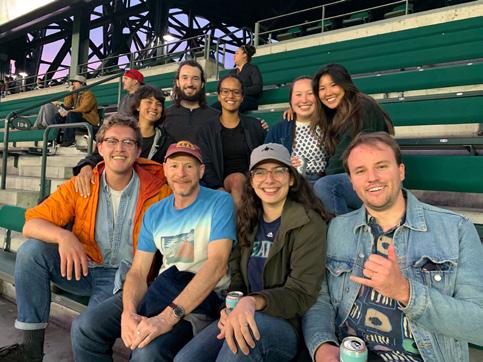
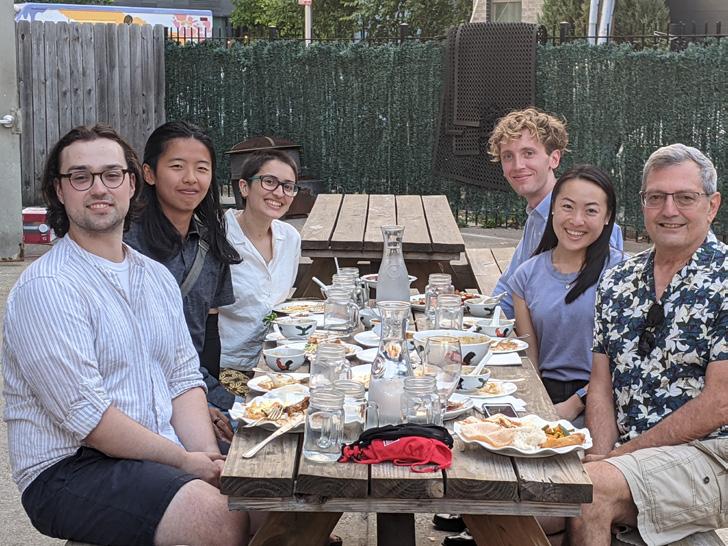
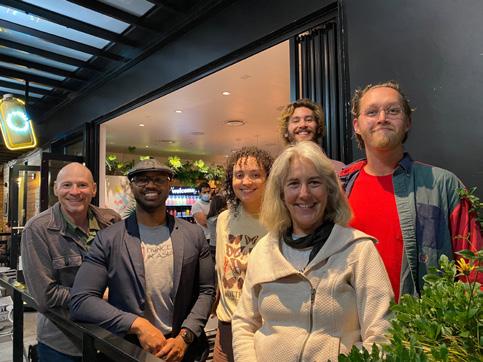
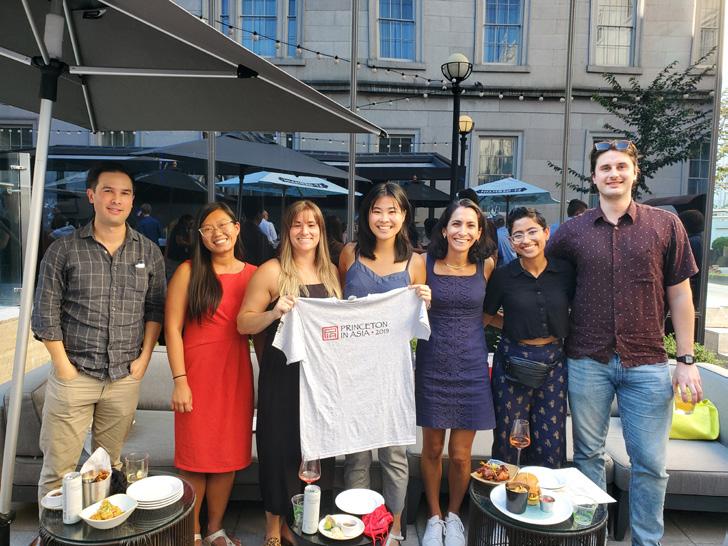
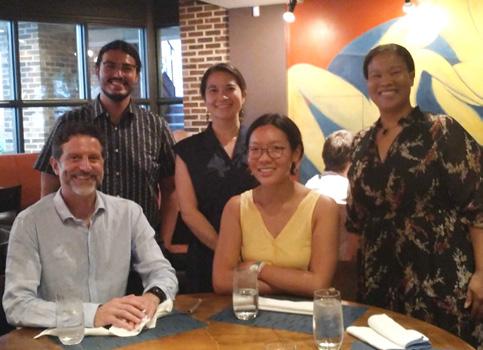

Jessica Lander’s (Thailand ‘10) new book, Making Americans: Stories of Historic Struggles, New Ideas, and Inspiration in Immigrant Education, takes the reader on a powerful and urgent journey—told through captivating stories of the past, the present, and the personal—to understand what it takes for immigrant students to become Americans. Jessica’s time as a PiA Fellow impacted her choice to become an educator and to work specifically with immigrant-origin students. Her new book thus has roots in her time with PiA.
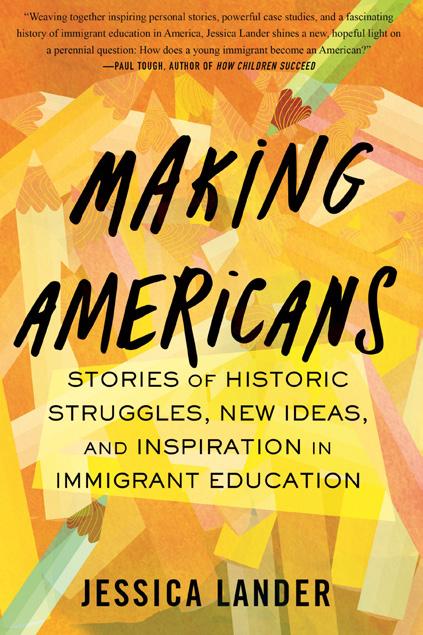
Peter Lighte’s (Taiwan ‘69) memoir Straight Through the Labyrinth chronicles his quest for fatherhood as he seeks to adopt a Chinese baby amid Hong Kong’s handover back to China in 1997. Peter navigates his way through daunting bureaucracy and unforeseen drama – and prevails, likely becoming Hong Kong’s first adoptive gay father.
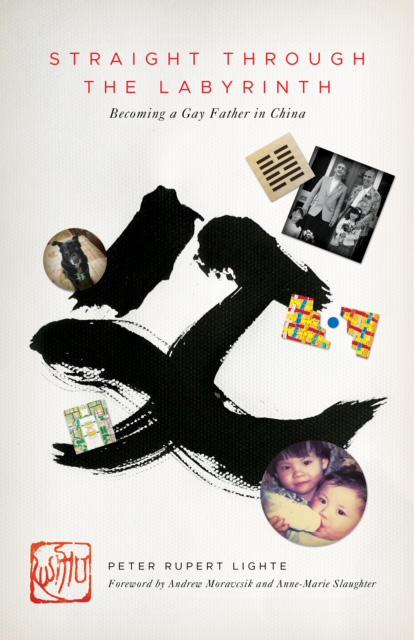
Amy Kohout’s (Laos ‘05) first book comes out in January with the University of Nebraska Press. Taking the Field: Soldiers, Nature, and Empire on American Frontiers examines how soldiers who served in campaigns against Indigenous people in what is currently the US West and in the Philippine-American War made sense of the landscapes of their service in order to get at the tangled web of American ideas about nature and empire in the late nineteenth and early twentieth centuries. Amy says this project would not exist without her PiA year in Vientiane, Laos.
